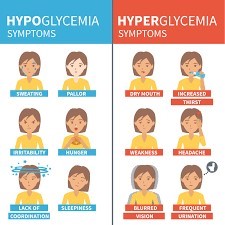A nurse is teaching a client who has a new prescription for metformin extended-release tablets.
Which of the following statements by the client indicates an understanding of the teaching?
"I will take the medication in the morning.”
"I will expect to gain weight.”
"I will take the medication on an empty stomach.”
"I will avoid crushing this medication.”
The Correct Answer is D
Choice A rationale:
The statement, "I will take the medication in the morning," indicates lack of understanding. Metformin is usually taken with large meals, and taking it in the morning is not the best timing.
Choice B rationale:
The statement, "I will expect to gain weight," is incorrect. Weight gain is not an expected side effect of metformin. In fact, metformin is often associated with weight loss or weight maintenance, especially in individuals with diabetes, as it helps improve insulin sensitivity and glucose metabolism.
Choice C rationale:
The statement, "I will take the medication on an empty stomach," is incorrect for extended-release metformin tablets. Unlike immediate-release metformin, extended-release tablets should be taken with meals to reduce the risk of gastrointestinal side effects.
Choice D rationale:
The statement, "I will avoid crushing this medication," is correct. Metformin extended-release tablets should never be crushed or broken, as it can affect the way the medication is released into the body. Crushing or breaking the tablet can lead to a sudden release of a large amount of metformin, potentially causing an overdose.
Nursing Test Bank
Naxlex Comprehensive Predictor Exams
Related Questions
Correct Answer is D
Explanation
- A. This choice is incorrect because an older adult client who reports constipation of 4 days is not an urgent situation that requires immediate attention. The nurse should assess the client's hydration status, bowel habits, and medication use, and provide education on dietary and lifestyle modifications to prevent constipation.
- B. This choice is incorrect because a preschooler who has a skin rash is not an urgent situation that requires immediate attention. The nurse should assess the type, location, and distribution of the rash, as well as any history of allergies, exposure, or infection, and provide appropriate treatment and education.
- C. This choice is incorrect because an adolescent who has a closed fracture is not an urgent situation that requires immediate attention. The nurse should assess the site of injury, neurovascular status, pain level, and immobilization device, and provide analgesia and education on fracture care.
- D. This choice is correct because a middle adult client who has unstable vital signs is an urgent situation that requires immediate attention. The nurse should assess the client's level of consciousness, airway, breathing, circulation, and possible causes of instability, and initiate lifesaving interventions.
Correct Answer is A
Explanation
Irritability.

The rationale for each choice is as follows:
- A. Irritability: Correct. Irritability is one of the signs of hypoglycemia, which occurs when blood glucose levels fall below 70 mg/dL (3.9 mmol/L). Other signs include shakiness, sweating, hunger, headache, confusion, and blurred vision.
- B. Increased urination: Incorrect. Increased urination is one of the signs of hyperglycemia, which occurs when blood glucose levels rise above 180 mg/dL (10 mmol/L). Other signs include thirst, dry mouth, fatigue, nausea, and fruity breath odor.
- C. Vomiting: Incorrect. Vomiting is not a specific sign of hypoglycemia or hyperglycemia, but it can occur as a complication of either condition if left untreated or poorly managed.
- D.Facial flushing: Incorrect. Facial flushing is not a sign of hypoglycemia or hyperglycemia, but it can occur as a side effect of some medications used to treat diabetes, such as niacin or rosiglitazone.
Whether you are a student looking to ace your exams or a practicing nurse seeking to enhance your expertise , our nursing education contents will empower you with the confidence and competence to make a difference in the lives of patients and become a respected leader in the healthcare field.
Visit Naxlex, invest in your future and unlock endless possibilities with our unparalleled nursing education contents today
Report Wrong Answer on the Current Question
Do you disagree with the answer? If yes, what is your expected answer? Explain.
Kindly be descriptive with the issue you are facing.
